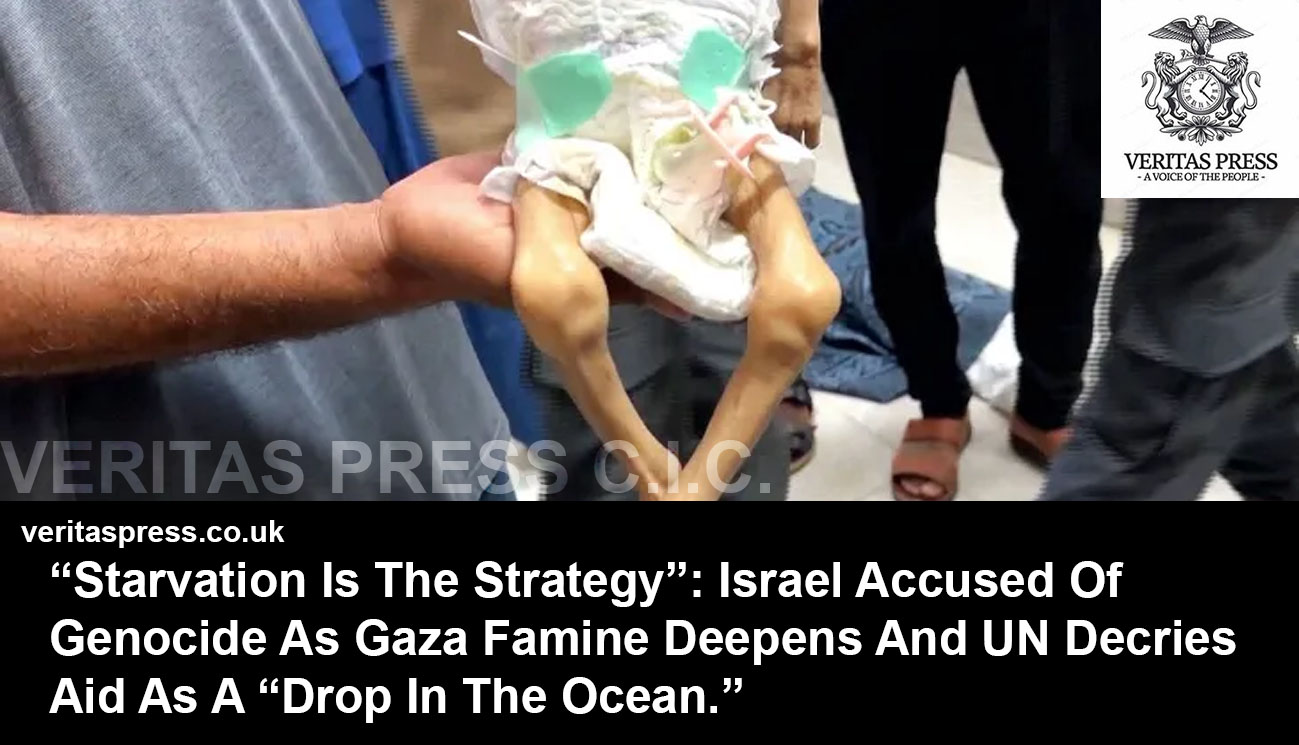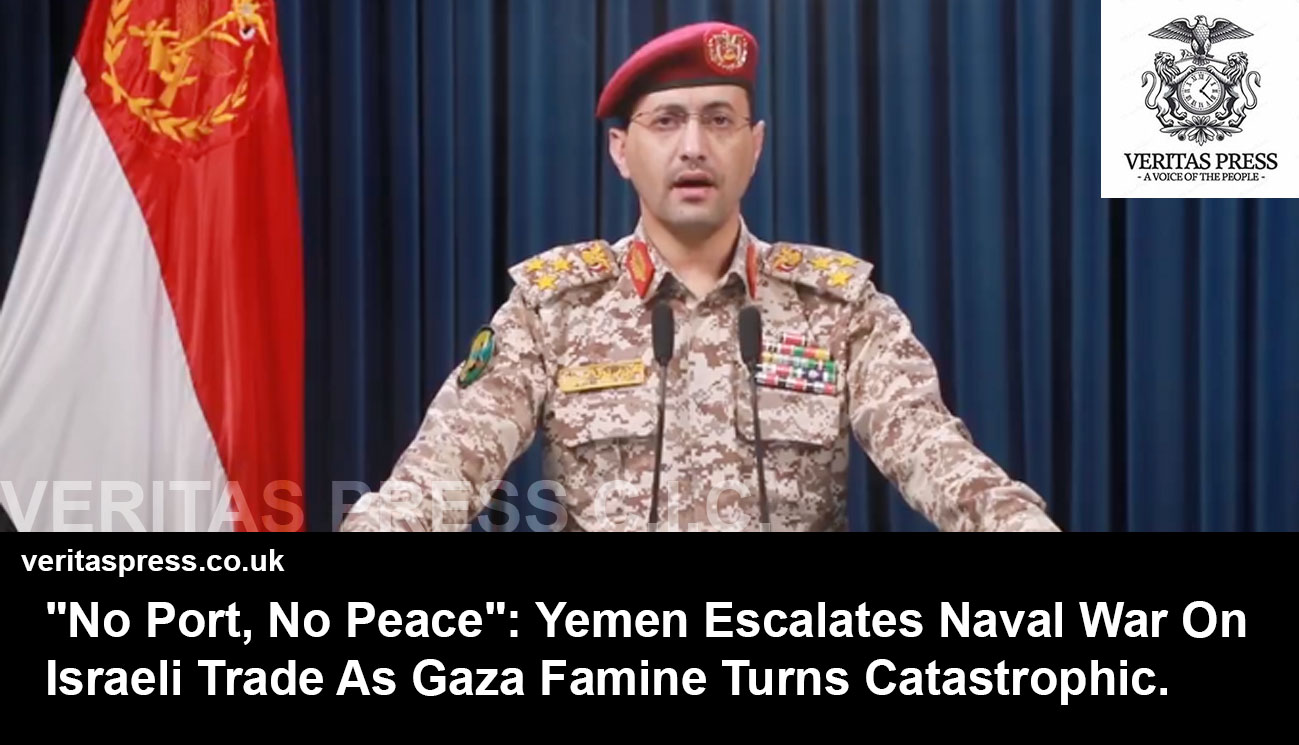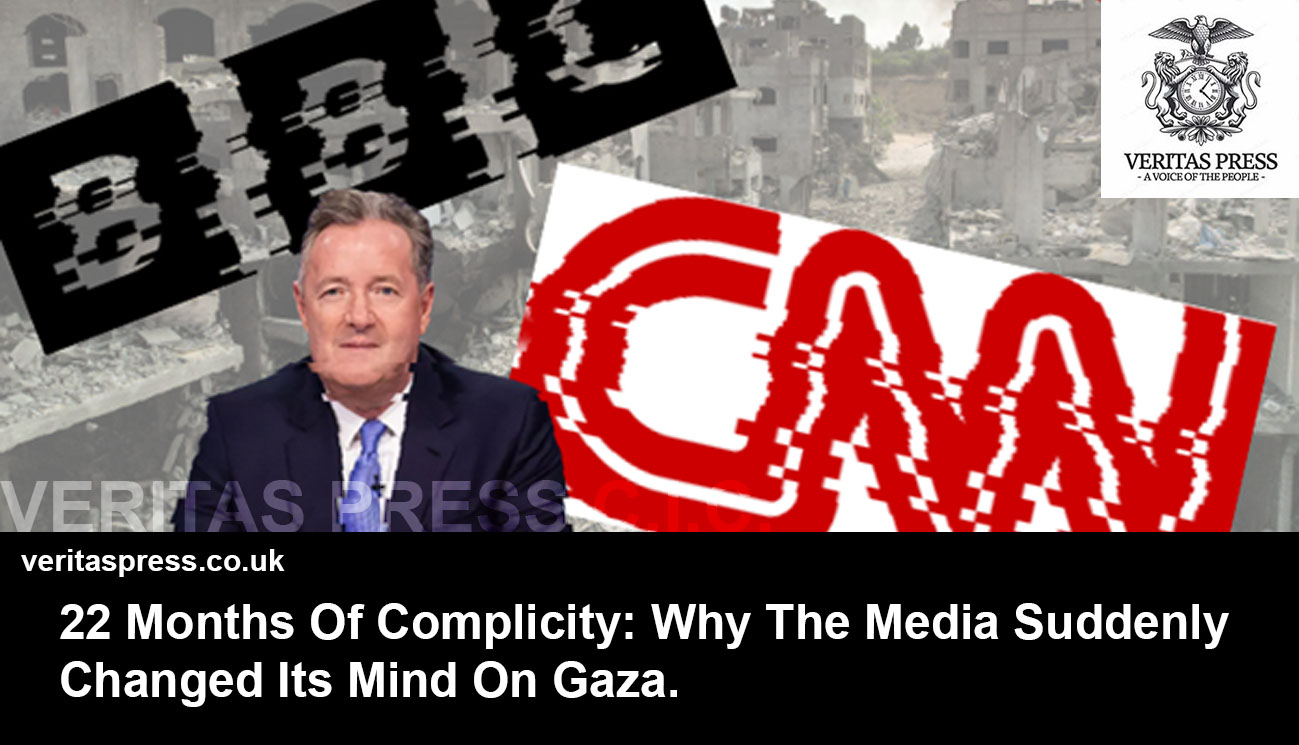Gaza Strip – Israel’s blockade of Gaza is not a military necessity; it is a methodical campaign of mass starvation, say doctors, aid workers, and human rights groups. Despite mounting international pressure and an unfolding humanitarian catastrophe, Israel continues to throttle food and medical aid into the besieged enclave, as emaciated children die in hospital corridors and families collapse from hunger on the streets.
This week, the United Nations’ humanitarian chief, Martin Griffiths, condemned the meagre trickle of aid permitted by Israel as “a drop in the ocean,” warning that arbitrary restrictions and direct military attacks on civilians and aid convoys are turning Gaza into “a graveyard for international law.”
“We are witnessing a premeditated collapse of human life,” said Griffiths in an interview with Al Jazeera. “It’s not just about quantity of aid, it’s the deliberate weaponisation of denial.”
Yet even as starvation deaths mount, Israeli Prime Minister Benjamin Netanyahu flatly denies responsibility. “There is no starvation, and there is no policy of starvation,” he told Arutz Sheva, insisting that Israel will press ahead with its military campaign “until Hamas is destroyed.” His remarks come as at least 14 more Palestinians, including two children, died of hunger in the last 24 hours alone, according to Gaza’s Health Ministry. That brings the confirmed toll from famine to 147, including 88 children, since Israel began its full blockade last October.
Eyewitnesses: “They Shot At Us For Queuing For Bread.”
While Netanyahu denies a starvation policy, the reality on the ground tells a different story. In Gaza City’s Tel al-Hawa neighbourhood, Israeli forces opened fire this week on hundreds of Palestinians waiting near a food distribution point, killing at least one and wounding many.
“We were just waiting for flour and canned goods. Then the bullets came,” said Rami Abu Saleh, a 26-year-old resident who survived the attack but lost his cousin. “They shot at us for queuing for bread. This is not war, it’s extermination.”
Similar scenes unfolded in Deir al-Balah, where drone fire and sniper attacks reportedly targeted civilians at another aid site. Videos verified by Middle East Eye show frantic crowds scattering as gunfire erupts near waiting lines.
Hospitals Overwhelmed, Doctors Powerless:
Inside Gaza’s collapsing hospitals, doctors describe scenes of utter despair.
“We no longer admit malnourished children, we count them,” said Dr. Samah al-Kurd, a paediatrician at Al-Aqsa Martyrs Hospital. “They arrive skin and bones, unable to cry. Most die within hours.”
The World Health Organisation confirms that more than 40,000 infants are at risk of imminent death from hunger, dehydration, and treatable infections. The UN has repeatedly accused Israel of deliberately targeting Gaza’s health infrastructure: over 80% of water and sanitation systems have been destroyed, and nearly 90% of educational and medical facilities are in ruins.
“This isn’t collateral damage,” said Dr. Ahmed Mokhallalati, a surgeon at Shifa Hospital. “This is siege warfare; Israel is trying to make life impossible.”
Israeli Rights Groups: “This Is Genocide.”
In a groundbreaking development, two major Israeli human rights groups, B’Tselem and Physicians for Human Rights–Israel (PHRI), have declared Israel’s actions in Gaza as genocidal.
“We have reached the painful and unequivocal conclusion that Israel is committing genocide,” said Yuli Novak, B’Tselem’s executive director. “This is a coordinated state policy to destroy Palestinian life in Gaza.”
B’Tselem’s new report catalogues official incitement, military statements, and a systematic pattern of destruction, ranging from flattened residential blocks to the use of starvation as a tactic.
PHRI’s legal analysis is equally damning. The group accuses Israel of deliberately dismantling Gaza’s health system and blocking lifesaving medical aid.
“This is not incidental to war,” said Guy Shalev, PHRI’s executive director. “It is a calculated policy to annihilate a population.”
Both organisations have urged the international community to activate all mechanisms under the Genocide Convention, warning that similar patterns are emerging in the occupied West Bank.
Global Experts Agree: “A Case Of Genocide.”
The Israeli groups join a growing list of global experts who say the Gaza war meets the legal definition of genocide. In December 2024, Amnesty International made that determination, followed by Human Rights Watch and UN Special Rapporteur Francesca Albanese, who published two reports accusing Israel of genocidal intent.
Most recently, Israeli-American genocide scholar Omer Bartov, a professor at Brown University and Holocaust expert, wrote in The New York Times that he could no longer avoid the truth.
“Having served in the Israeli army and studied genocide for decades, my inescapable conclusion is that Israel is committing genocide in Gaza,” Bartov wrote. “This was a painful conclusion, but I know what genocide looks like. And this is it.”
Trump: “That’s Real Starvation Stuff”
Even Donald Trump, who has repeatedly supported Israel’s military campaign, appeared to waver this week.
“Some of those kids, that’s real starvation stuff,” he said during a visit to Scotland, referring to images of skeletal children emerging from Gaza. “I want [Netanyahu] to make sure they get the food.”
Trump’s comments reflect growing discomfort among Western leaders, many of whom have provided Israel with military, political, and financial support throughout the war. Yet most have stopped short of enforcing consequences.
“It’s one thing to express concern,” said Sarah Leah Whitson, executive director of DAWN. “It’s another to halt arms sales or impose sanctions. Until that happens, every Western government enabling this siege is complicit.”
ICC Warrants And Global Inaction:
In November, the International Criminal Court issued arrest warrants for Netanyahu and former Defence Minister Yoav Gallant, citing war crimes and crimes against humanity in Gaza. But enforcement remains unlikely, as the United States and European powers continue to shield Israeli leaders from accountability.
“There is a crisis of impunity at the heart of this genocide,” said Michael Lynk, former UN special rapporteur on the occupied territories. “The rules of war are meaningless if states refuse to enforce them.”
“This Is the Endgame”
For many in Gaza, the blockade and bombardment are not simply tactics; they are the strategy.
“They want us gone,” said Hadeel Wahdan, a displaced teacher sheltering in a Rafah tent camp. “If bombs don’t kill us, hunger will.”
“This is not about Hamas,” added Fadi Abu Taha, a local aid worker. “This is about erasing Gaza and the people in it.”
As starvation deaths rise and aid continues to be denied or destroyed, the question for the international community is no longer whether genocide is occurring, but what it will take to stop it.
Conclusion: Starvation By Design, Silence By Choice.
What is unfolding in Gaza is not a humanitarian crisis born of mismanagement, it is the systematic starvation and destruction of a people, executed through siege, bombardment, and deliberate policy. The death toll from hunger is rising daily, aid convoys are obstructed or looted, food prices are astronomically inflated, and Gaza’s children, those who survive the bombs, are now wasting away in front of the world’s cameras. This is not chaos. This is calculated cruelty.
Israeli Prime Minister Benjamin Netanyahu insists “there is no starvation,” and that the path to “normalisation” lies in the release of hostages. This line is repeated endlessly by Israeli officials and Western diplomats as if the blockade and famine are simply the unfortunate consequences of Hamas’s actions. But this narrative crumbles under scrutiny.
In reality, Israel’s own policies betray any genuine concern for hostages. The infamous Hannibal Directive, a long-standing Israeli military policy, authorises the use of overwhelming force, even at the risk of killing Israeli captives, to prevent their transfer or negotiation leverage. It is, in effect, a doctrine of “kill rather than compromise.” This policy was invoked in past conflicts and widely believed to have contributed to the deaths of several Israeli hostages in the current war. Israel’s argument that the siege will end if hostages are returned is exposed as a hollow pretext for continuing a campaign of annihilation.
Meanwhile, the 10,000+ Palestinian detainees held in Israeli prisons, including at least 1,500 children, are all but ignored by the same international leaders who demand the release of Israeli captives. These Palestinian prisoners are often held without charge or trial under administrative detention, in flagrant violation of international law. Many report torture, sexual violence, starvation and denial of medical care. Their families live with no information, no access, no rights.
“The international community has dehumanised Palestinian captives,” said Mariam Abu Daqqa, a former detainee and human rights advocate. “They are not hostages. They are political prisoners, many as young as 12, taken from their homes at gunpoint.”
Even as food trickles into Gaza, it is not reaching the mouths that need it. Aid trucks are routinely stalled or turned back at Israeli checkpoints. Eyewitnesses and humanitarian officials report that entire convoys rot under the sun, or are pillaged and diverted to black markets. Some of the food is sold in Israeli or West Bank markets, far out of reach of Gazan families. What little aid does reach the Strip is subject to exploitative inflation, with a kilo of flour now costing what a week’s salary once did.
“This is not a famine caused by nature,” said Juliette Touma, spokesperson for UNRWA. “This is engineered. The conditions are created and sustained by policy.”
Israeli human rights groups, including B’Tselem and Physicians for Human Rights–Israel, have issued damning reports concluding that Israel is committing genocide. They cite not only the starvation campaign, but direct attacks on civilians, the destruction of health infrastructure, and explicit incitement to annihilate Gaza’s population. Their findings align with those of Amnesty International, Human Rights Watch, the UN Special Rapporteur, and genocide scholars like Omer Bartov, who has called Israel’s war an “inescapable case of genocide.”
Even Donald Trump’s recent remarks, urging Netanyahu to “make sure [the children] get the food” are nothing more than political theatre, designed to soften Israel’s image in the face of global backlash. Despite the rhetoric, there has been no shift in U.S. policy, no enforcement of ICC warrants, no pressure to lift the blockade. Trump’s comments serve not the starving, but the headlines.
“The optics are changing, but the policies remain,” said Dr. Nora Erakat, a legal scholar and human rights lawyer. “This is not about hostage deals, it’s about destroying Gaza, with the full backing of the West.”
The starvation of Gaza is not a side effect of war; it is the strategy itself. The goal is not to defeat Hamas, but to make Gaza unliveable, to drive its population into permanent exile, dependency, or extinction. If the world cannot recognise this and act decisively to stop it, then it becomes not a passive witness, but an active participant.
The question remains: If the mass starvation of children, the destruction of a people, and the erosion of every basic right does not constitute a red line, what does?
If this is not genocide, what is?
Advertisements
Tags:




























Leave a Reply